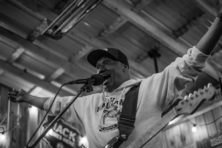The Final Fight of Pita Kotobalavu
- Share
- Tweet
- Pin
- Share

Unity singer played to the end
He had them from the start. Had them in a way a crowd hadn’t been had before, at least not in Door County. Things were just different at that first show.
There was the energy. The crowd pulsating, sweating, jumping and rattling the wood of the old dairy barn that was usually home to a more patient level of folk and bluegrass.
There was the style. Reggae, a genre rarely heard on a peninsula used to classic rock, blues, and folk.
Most of all, there was the presence. The tall, strong, dreadlocked presence of Pita Kotobalavu, leaping around the stage, imploring the crowd to dance with him, to sway with him, to come along with him for the experience, together.
That Fourth of July Fishstock gig introduced Unity the band to Door County, a fill-in show after the scheduled band canceled. Kotobalavu had the audience hooked from the start – and kept them hooked for 20 years and hundreds of Door County shows, thousands more south of the bridge.
Kotobalavu also knew there was something else that drew people to him. As a tall black man with dreadlocks, he was an uncommon site throughout Wisconsin, but especially here.
“Him being different in Wisconsin helped a lot, because people were interested,” recalled Tony Bessen, a friend and a guitar player for Unity since 2015. “There are not many people from the middle of the Pacific Ocean with dreadlocks down to their butt hanging around here. It worked in his favor too.”

But not always.
“At first when I came here, it was very hard,” Kotobalavu said. “I’ve been called names; I’ve been called the n-word; but I put the music first. I can’t get involved in the negative. I’ve got to be positive. You try not to take it personally, and you try to put it back out in a positive way.”
That worked for Kotobalavu. Born to a black father and white mother, he felt comfortable in all worlds, playing to all people. He erred on the side of giving people the benefit of the doubt.
“They may be having a bad day,” he said.
Music as an Expression of Love
That uncommon grace is what people remembered most about Kotobalavu after he died in January at age 55, finally succumbing to the colon cancer that had torn at his body for a year and a half. By the end it had spread to his lungs, his liver, his bones.
“He just had a giant soul,” said Michael Theroux. “There’s probably nobody that I’ve known in my life that had such a big heart and a big soul.”
Many fans didn’t know he was sick because Kotobalavu wouldn’t let them know. Certainly they could pick up on it on their own, as his trademark stage energy waned. Eventually, he would perform mostly from a chair, but he wasn’t going to stop, and he didn’t want his shows to be about his battle, only about the music and the moment he was sharing with the crowd.
His wife, Kay Halbrook, said playing fueled his fight to live.
“The music kept him going,” she said. “He would sometimes say he was done and wanted to stay home, and then he’d get a call for a gig and he wanted to play so bad. Music was his way of expressing his love for everybody.”
Halbrook and Kotobalavu had met at a show in Neenah in 2010, and though she didn’t take it as a serious relationship at first, she said “Pita kept showing up.” They married, merging into a family of her two children, Ian and Grace, and his, Sebastian and Melanie.
So he played, and he played, and he played. At Waterfront Park, at Husby’s Garage, at the Fourth of July in Sturgeon Bay, at Peach Barn. For the last year he traveled with Halbrook in an RV they purchased to make the travel more comfortable for him. As his condition deteriorated, his band picked him up. They wouldn’t let him help load gear in and out of shows. They didn’t ask him for more than he could give.
Kotobalavu would arrive as late as possible to avoid having to talk about his condition to people one-on-one. He wanted to keep it on stage.
“He wasn’t up there telling everyone he was sick, he wanted them to enjoy the show,” said Michael Theroux, who played with him off and on since 2008.
“He didn’t want to break that spell of what connected him with the audience,” Halbrook said.
‘A Really Special Thing’
Over the years Unity’s lineup had transformed many times, but Kotobalavu was constant. As his condition worsened, other bandmates stepped up to sing more and carry more energy, but nobody was going to step into his shoes.
“Nobody had any ideas of trying to step up front,” Theroux said. “He was the band. That band can never exist again. Unity was a really special thing. It wouldn’t be Unity without him.”
Some performers want a specific crowd. Some want you to hang on their every chord and musing. Some are insulted by the site of a child in the audience.
Kotobalavu saw every crowd as an opportunity to connect. At a concert in Wausau, he pulled dozens of kids onto the Stage to sing The Lion Sleeps Tonight. At Husby’s Garage, he would whip a crowd of 22 year-old bros into a frenzy. At a Concert in the Park, he would turn gray-haired retirees into superfans.

“He somehow was able to care about everybody all at once,” Bessen said. “His Fijian warrior would come out and he was in that moment and only in that moment. He could really connect with anyone.”
“He was totally genuine,” Theroux said. “He didn’t have a big ego about anything. I’ve been in bands that had big egos. I played in a lot of other bands but I always came back to Unity. He’s the best frontman I’ve ever played with.”
The End
In October of 2023, Halbrook thought Kotobalavu may have played his last show. Unity had two more gigs scheduled, including a final New Year’s Eve show at Peach Barn in Sister Bay. Halbrook let them know they might need backup plans, but Kotobalavu played on. He told this writer last May that it would be perfect if he played up until the very end – and he almost did. The Peach Barn show was his last. He died just two weeks later.
“He kind of borrowed from the future,” Bessen said. “He lived for it. If he would have stopped he would have had no point to live. Why not run it to the end?”

Unity ends with Kotobalavu. There will be no reincarnation. For the first time in two decades, a Door County summer won’t feature the band’s name on the music slate, but he lives on in memories and spirit.
“Pita was a very spiritual person,” Halbrook said. “If people knew him, they know he believed in the spirit world very deeply. He did not have fear of death. He felt ripped off because he wanted to stay here and do all the things he wanted to do here. But he also felt like he was going back to meet his ancestors. He was at ease with the idea of that.”
Kotobalavu and Halbrook were building a house in Fiji, the place he was still very much connected to from thousands of miles away and the place he loved more than any other.
“I know he’s there,” she said.
A little piece of him is here, too – wherever people are dancing at venues all over Door County.
Celebration of Life for Pita Kotobalavu
April 21, 1-5 pm
Fifth Ward Brewing, Oshkosh



